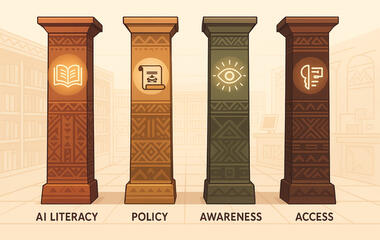To fully benefit from the transformative potential of artificial intelligence (AI) in libraries at African universities, researchers have suggested a four-pillar approach that is built on AI literacy, policy initiatives, awareness, and access.
Sifundo Nkomo and Walter Matli published a study titled, ‘Adoption of artificial intelligence for library services at universities in Africa: Are we there yet?’ in the South African Journal of Libraries and Information Science earlier in June.
They found that, despite rapid advancements in AI and its transformative potential, its adoption in library services at universities across Africa remains limited, mainly due to policy issues, unintelligible decisions, poor data quality, and ethical concerns.
The authors conducted an integrative literature review on AI’s implications for university libraries in Africa to identify and map articles published from 2020 to 2024 to evaluate the extent to which AI has already influenced these services.
Key findings
An analysis of 13 articles revealed that the barriers associated with AI implementation in African university library services include a lack of awareness, financial constraints, privacy and ethical concerns, user acceptance and resistance, organisational culture change, inadequately trained experts, limited power supply, poor internet access, insufficient data or low data volumes, lack of technological skills and infrastructure, and poor digitisation policies.
The study revealed that librarian awareness is influenced by factors like access to information, training, organisational support, and the perceived benefits of using AI.
Likewise, issues that affect a library’s readiness to adopt AI include awareness, acceptance, the perception of value, application experience, leadership attention, the innovation atmosphere, and competitive pressure.
The study revealed that the positive applications associated with AI in library services include chatbots and virtual assistants, improved resource discovery, efficient collection management, improved accessibility for library users, and expanded access to information.
Despite these potential benefits, only a few university libraries in Africa have adopted AI technologies that could be used to render various library services such as answering directional and ready-reference questions posed by library users, serving as a knowledge base for cataloguing information on library materials, serving as self-check machines for books, a marketing tool for the library, a tool for statistics evaluation and recommendations, and assisting in the charging and discharging of library materials, according to the study.
The authors point out that, while some librarians accept AI as a potential tool to enhance efficiency and user experience, others harbour concerns about its impact on job roles, user privacy, and the quality of human interaction within libraries. Many librarians in the former group perceive AI as a promising way to streamline routine tasks and improve the delivery of services, the study found.
Framework for AI adoption
To benefit from the general view that “library leaders, practitioners and scientists in academic libraries in Africa have a favourable outlook on AI and are ready to implement AI initiatives”, the authors propose an integrated framework suggesting successful implementation should be built on the four pillars of literacy, policy initiatives, awareness, and access, which are all interlinked.
The study calls upon African governments to show their commitment to 21st-century education by developing and fully implementing national policies that support modern teaching and learning which includes understanding information and communication technology (ICT) in education policy, curriculum and assessment, pedagogy, AI skills application, organisation and administration, and library policy.
The study further recommends that African governments should collaborate with international organisations such as UNESCO to align their goals with digital transformation and educational advancement, regardless of location.
It also suggests that university and library management should support the adoption of AI by making available the needed infrastructure, software and connectivity to access the tools and digital technologies that are needed to ensure effective implementation.
Specifically, the study recommends that BOTSA, a new AI-driven library service chatbot, should be adopted in all academic libraries to answer basic library-related inquiries automatically and, therefore, allowing academic librarians to focus on other library services that cannot be automated.
Training and mentorship should be organised for both academic librarians and library users to acquire knowledge, skills, and attitudes to use AI tools and technologies effectively, and AI technologies should be adapted for different age groups and regions, the authors of the study advise.
To serve rather than threaten
Commenting on the study, Professor Arshin Adib-Moghaddam, the co-director of the Centre for AI Futures at the School of Oriental and African Studies at the University of London, told University World News that higher education policy in Africa and elsewhere can benefit from the responsible use of AI if legal and ethical concerns are addressed from the outset.
“The implementation of the four-pillar framework for adopting AI in university library services in Africa will face technological, legal, and ethical challenges,” Adib-Moghaddam said. “All three can be mitigated by involving experts from civil society organisations, as well as academics who specialise in the ethics of artificial intelligence from a human security perspective,” he added.
“As I have argued in my new book, The Myth of Good AI. A Manifesto for Critical Artificial Intelligence, just published by Manchester University Press, the Global South plays a major role in the AI-induced new world order.
“Africa and other regions in the Global South play a crucial role in ensuring that AI is not exploitative and that it serves, rather than threatens, our human rights,” he said.
University World News














